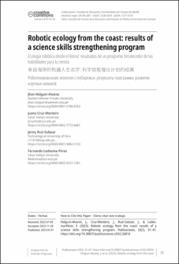Robotic ecology from the coast: results of a science skills strengthening program

View/
Download
(application/pdf: 708.7Kb)
(application/pdf: 708.7Kb)
Date
2023-01-01Author(s)
Holguin-Alvarez, Jhon
Cruz-Montero, Juana
Ruiz-Salazar, Jenny
Ledesma-Pérez, Fernando
Metadata
Show full item recordAbstract
“Introduction: Coastal waste increases up to four times each year, although many of them
can generate sustainability if they are used as renewable resources; in this sense, the research is based on Garofalo’s STEAM proposal, adapting its urban robotic version to the educational exploration of beaches. An experiment of social responsibility was developed
through a robotic ecology program based on three pedagogical phases: (a) Social ecological intelligence, (b) Social scientific task, (c) Scientific reflection; whose effects try to contribute to the sustainable care of a polluted beach.
Method: Through the positivist paradigm, experimental design study, two groups of students were formed out of a total of 80 subjects residing in a coastal district of Lima. A
contaminated beach context was approached, from which basic school students recycled
waste to elaborate robot prototypes.
Results: The data compared in the experiment reported significant indices that support the
increase in scientific skills and awareness of the environment, as well as the indicators that care for natural elements and their resources. The robotic ecology program improved the skills of scientific knowledge, observation and reflection.
Conclusions: The improvement of scientific skills increased significantly in the experimental group (t (74) = -3.831; p < .005), as well as in environmental awareness (t (72) = -2.720; p < .005).
Although the dimensions improved, the differences obtained in knowledge capacity were
not significant in the group comparison“
Collections
- Web of Science (WOS) [236]

